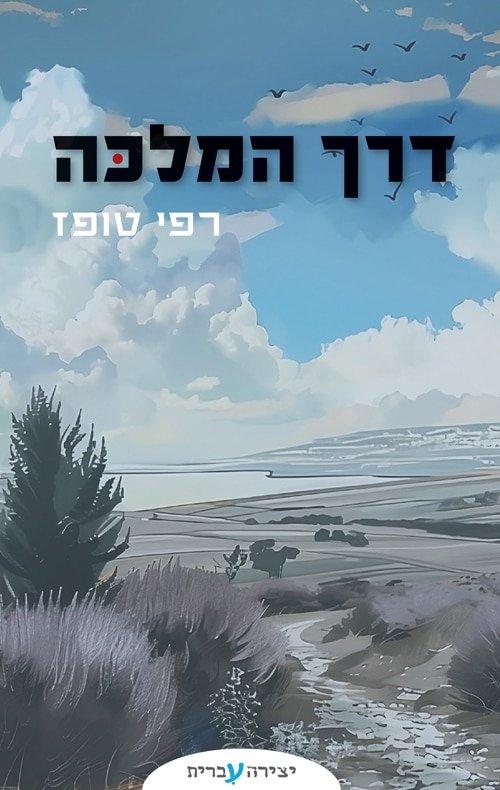Please scroll down for an English review.
לאחר שבעלה, הרצל, נהרג בקטטה בין נהגים מירי אקדח, מחליטה מלכה פיינגולד שדי לה מהשכנים, המשפחה ובאופן כללי מהחיים שבחרה לעצמה.
"בבוקר ניסתה להתווכח על גובה הסכום, אבל הוא רק הסתכל בה במבט מבטל, כזה שתמיד הרגישה שמקיף אותה בעיגול גדול של אפס, ואז אמר שתלך להתלבש."
במשך שנים היתה נשואה לגבר אלים מילולית וכנראה גם פיזית שהשתיק את קולה. היא איבדה את בנה שנהרג בתאונה בחו"ל ויחסיה עם בתה אינם קרובים. זה לא חדש שהקול של מלכה היה מושתק. בעברה המשפחתי סבלה מטרגדיה וטראומה ומערכת יחסיה עם אביה פושרים. בצעירותה, אימא שלה עזבה את הבית ואז נפטרה ואביה עבר לגור עם אישה אחרת. מלכה גדלה אצל סבא וסבתא שלה.
כך כאשר הרצל נהרג בקטטה, היא חשה פתאום שחרור שלא חשה זמן רב. הוסר ממנה עול וסורגי הכלא של נישואיה ואולי גם חייה נפתחו. מלכה מחליטה לצאת למסע למצוא את עצמה ואת הקול האבוד שלה.
היא עולה על אוטובוס מבלי לדעת לאן הוא מגיע. את הטלפון הנייד היא זונחת ולוקחת רק מעט חפצים כדי שתוכל להתנייד בקלות ממקום למקום.
בתנועות בין עבר להווה מלכה מחליטה להיות מלכה (Queen) ולקבל שליטה על חייה.
במסע היא משחזרת את העבר שלה ואת מערכת יחסיה עם אביה ואימה. היא תפגוש אנשים טובים יותר וכאלה שטובים פחות ובעיקר את תפגוש את עצמה בצמתי החיים השונים שלה.
הספר קולח והדמות של מלכה כתובה היטב. מלכה היא לא הטיפוס המתקרבן, לכן היא לא מקוננת על חיים ארוכים אבודים (היא בגיל 70) חיים של השתקה, הבלגה וויתור. היא בעיקר פרגמטית ומבצעת את החקירה והבדיקה האישית מתוך רצון אמיתי להתקדם.
ישנם חלקים שהייתי עורכת החוצה מהספר, בעיקר תיאורי הסקס שבעיניי מיותרים.
הדמויות המשניות גם כתובות היטב. בעיקר אהבתי את עיצוב הדמויות של רוני ושל מנשה. שתי דמויות שכל כך שונות מהרצל. במידת מה, שניהם דומים למלכה בחיי הבדידות וההשתקה שבם הם מתקיימים.
הדמות של רוני כתובה בצורה מאוד מוצלחת, כך שלמרות שהיא נראית כעלה נידף ברוח למול אישתו שבאופי שלה מזכירה את הרצל (טורחת להקטין אותו בכל הזדמנות), הרגישות וההרפתקאות שאליהן לקח את מלכה, היו מפתיעים וכרוח מרעננת ומשעשעת.
סוף הספר היה תלוש בעיניי ואינו מחובר לעלילה הראשית והוא איכזב אותי.
סה"כ ספר מהנה לקריאה וספתח טוב להוצאת יצירה עברית החדשה.
דרך המלכה/ רפי טופז
יצירה עברית, 2024, 266 עמ'
דירוג SIVI –
איכות אודיו –

After her husband, Herzl, is killed in a fight between drivers by gunfire, Malka Feingold decides that she has had enough of the neighbors, the family, and, in general, the life she has chosen for herself.
For years, she was married to a verbally and probably physically violent man who silenced her voice. She lost her son, who was killed in an accident abroad, and her relationship with her daughter is not close. It is not new that Malka's voice was silenced. In her family's past, she suffered from tragedy and trauma, and her relationship with her father was lukewarm. In her youth, her mother left home and then died, and her father moved in with another woman. Malka grew up with her grandparents.
So when Herzl was killed in a fight, she suddenly felt a release she hadn't felt in a long time. A burden was removed from her, and the prison bars of her marriage and perhaps her life were opened. Malka, with a courage that is both inspiring and admirable, makes a resolute decision to journey to find herself and her lost voice, offering a beacon of hope to those who may be in similar situations.
She gets on a bus without knowing where it is going, embracing the unpredictability of her journey. She abandons her mobile phone and takes only a few things to move quickly from place to place, adding to the intrigue of her adventure.
In movements between past and present, Malka decides to become Queen and gain control over her life.
In the journey, she recovers her past and relationship with her father and mother. She will meet better people and those who are less good, and above all, she will meet herself at various points in her life.
The book flows, and Malka's character is well-written. At 70, Malka is not approachable but does not lament a long-lost life of silence, panic, and giving up. Her age brings a wealth of wisdom and life experience, which she uses to conduct the investigation and personal examination out of a genuine desire to move forward.
There are parts that I would edit out of the book, especially the descriptions of sex, which, in my eyes, are unnecessary.
The secondary characters are also well-written. I especially liked the design of Roni and Menashe's characters, two characters so different from Herzl. To some extent, both resemble the Queen in their life of solitude and silence.
Roni's character is masterfully depicted, shining through even in the shadow of his wife, whose character echoes that of Herzl (constantly diminishing him). Roni's sensitivity and the adventures he shared with Malka were both surprising and refreshing, infusing the narrative with an amusing spirit.
The end of the book was a slip in my eyes. It was not connected to the main plot, and it disappointed me.
This is a captivating book that serves as an excellent introduction to the publication of the new Hebrew work, leaving readers excited about what's to come.
לגלות עוד מהאתר Sivi's Books
Subscribe to get the latest posts sent to your email.

